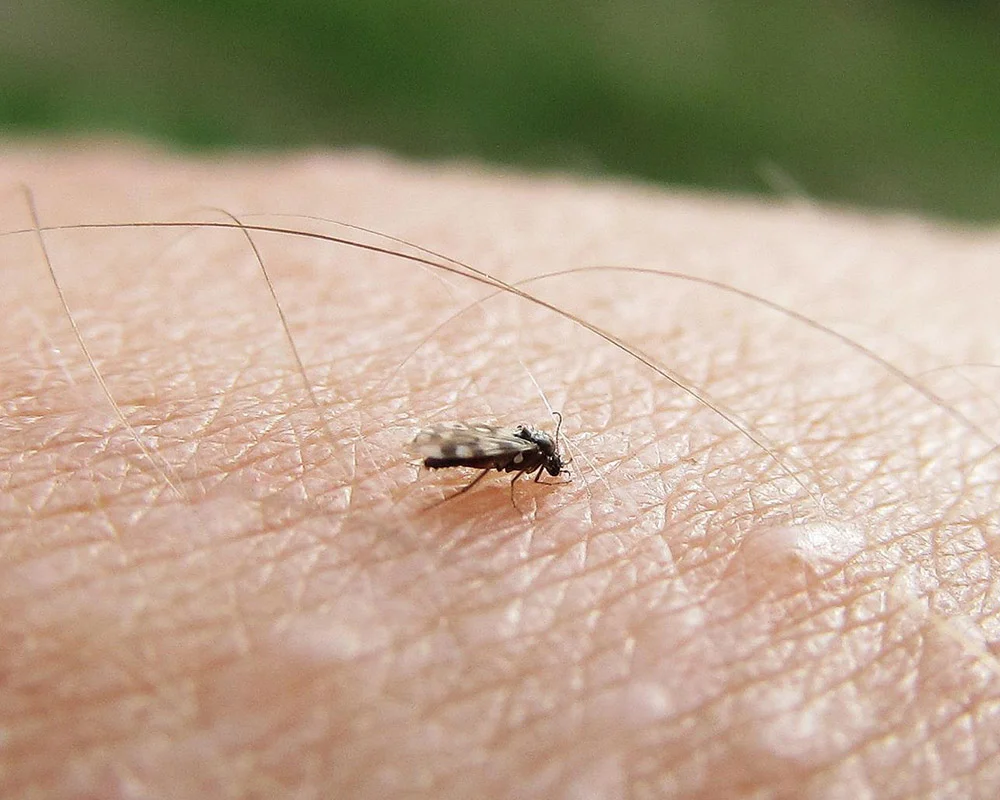What Are Midges?

Midges are tiny flying insects belonging to the family Ceratopogonidae. While often mistaken for gnats or mosquitoes, these minuscule pests can be a nuisance, particularly in warm and humid environments. Knowing how to handle midge bites with proper first aid techniques can help prevent complications.
Types of Midges: Biting vs. Non-Biting
- Biting Midges: Also known as “no-see-ums,” these are the primary culprits behind those itchy, red marks.
- Non-Biting Midges: Resemble mosquitoes but are harmless and do not feed on blood.
Identifying Midge Bites
- Appearance: Small, red, itchy bumps on the skin.
- Reactions: Some people may experience swelling or a mild allergic reaction, depending on their skin sensitivity.
How Long Do Midge Bites Last?
- Duration: Typically last for a few days to a week.
- Factors: Skin sensitivity and treatment quality can affect healing time.

Effective Treatment for Midge Bites
- Clean the Area: Gently wash the bite with soap and water.
- Apply a Cold Compress: Helps reduce swelling and itchiness.
- Use Anti-Itch Creams: Hydrocortisone creams or calamine lotion can provide relief.
- Avoid Scratching: Prevents infection and further irritation.
Master Wound Care & Emergency Response
Proper first aid knowledge helps you treat midge bites effectively and recognize when simple bites become serious allergic reactions requiring immediate care.
Preventing Midge Bites
- Wear Protective Clothing: Long sleeves and pants reduce skin exposure.
- Use Insect Repellents: Opt for products containing DEET, picaridin, or oil of lemon eucalyptus.
- Install Mesh Screens: Block entry through windows and doors.
- Avoid Peak Activity Times: Midges are most active during dawn and dusk.
The Importance of First Aid for Midge Bites
- Quick Response: Taking a first aid course in Caboolture equips you with the knowledge to manage insect bites effectively.
- Infection Prevention: Proper first aid can reduce the risk of complications.
- Allergic Reactions: Learn to identify and handle severe reactions swiftly.
Be Prepared for Allergic Reactions
While most midge bites are harmless, some people can experience severe allergic reactions. Learn to recognize and respond to emergencies confidently.
Why Am I Suddenly Being Bitten By Midges?
- Environmental Factors: Increased humidity, proximity to water bodies, or being outdoors during peak activity times can attract midges.
What’s Inside a Midge Bite?
- Saliva Injection: Midges inject saliva containing anticoagulants to keep blood flowing.
- Body Response: Triggers histamine release, causing redness, itching, and swelling.
Do Midges Carry Diseases?
- Human Risk: Generally low; while they can transmit diseases to livestock, transmission to humans is rare.
Outdoor Safety & Group Leadership
Planning outdoor activities or working with groups? Be prepared for insect bites, allergic reactions, and other wilderness emergencies.
When to See a Doctor
- Severe Symptoms: If you experience severe swelling, difficulty breathing, or signs of infection, seek medical attention promptly.
Emergency Response Skills Save Lives
Know when to act fast. Our courses teach you to recognize severe allergic reactions and provide critical care while waiting for medical help.
Final Thoughts
Midge bites, while annoying, are usually harmless. By taking preventative measures, treating bites properly, and being equipped with first aid knowledge from a first aid course in Launceston, you can minimize discomfort and enjoy the outdoors with peace of mind.
Start Your First Aid Journey Today
From midge bites to serious emergencies, be prepared with nationally recognized first aid training. Join 60,000+ Australians who trust IRFA.
